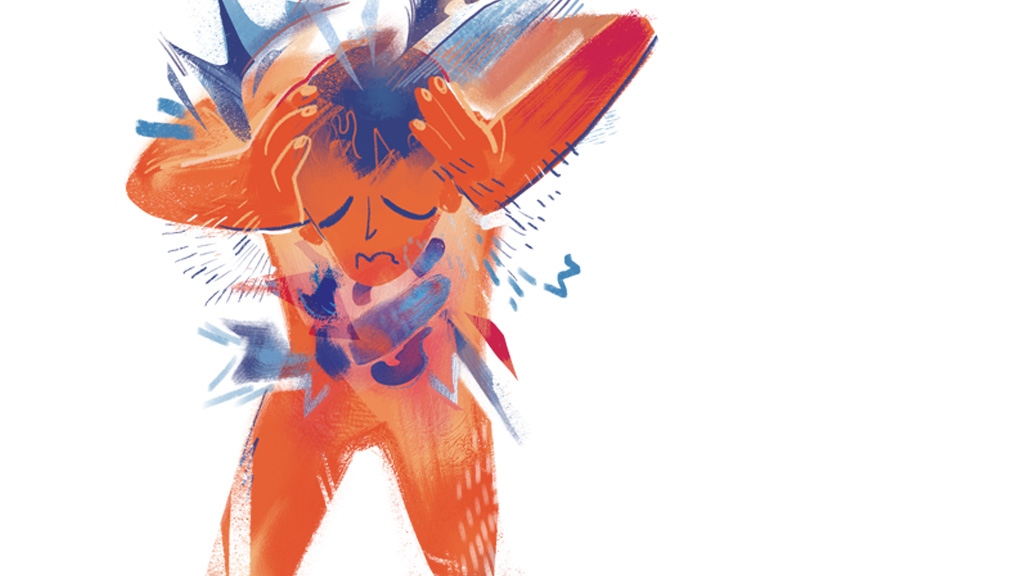Stress in Heart, Stress in Body
by Karina Le | published Mar. 2nd, 2019
It's been a long week of tough exams, sleepless nights and stressful moments. Your boss asked you to cover an extra shift at work — time you needed to work on a really important project. Your friend came to you with a tough dilemma, one you stayed up trying to help them solve.
At the end of the week, you're overwhelmed and stressed. It only takes one more small, yet strenuous thing before you're on your bedroom floor bawling your eyes out for what seems like ages. Everything in your face is congested and inflamed by the time the tears stop. Even though you get plenty of sleep that night, you feel sick to your bones in the morning.
How can emotions completely wreck your body like that? The answer is simple when looking at it from a physiological standpoint.
Health Perspective
The reasons why your health could be physically affected after an emotional outburst depend on the situation. Stressful times are one of the biggest concerns for college students.
Rebecca Houston, an assistant psychology professor at RIT, explained the damages of long term stress.
“Chronic stress can be detrimental to the immune system,” Houston said. “For acute stress, at least, it would activate your sympathetic nervous system — that fight or flight response. If that is activated for a prolonged period, in a sense [it] could deplete your [energy stores] and have adverse effects.”
Simply put, when the body has to continuously feed energy to any action, it will eventually get tired of sustaining it. The negative consequences start damaging the body when it reaches this low point, and it’s up to the individual to take care of themselves as a means to fight against such consequences.
In terms of the immune system, Houston explained how stress can have detrimental effects down the road in the form of telomeres. Telomeres are located on our DNA and protect each chromosome from deteriorating or merging with another.
“If you’re stressed a lot, your telomeres get shorter, [which] seems to be related to aging effects ... and it takes a toll on your physiological immune system,” Houston said.
With aging effects, an individual’s immune system will decline with the more damage it sustains. It's this weakness, Houston expressed, that exemplifies how heightened bouts of emotion can directly impact a person’s physical health.
How do people avoid such heavy stressors? Joyce Chu, a first year Psychology major, personally struggles with this.
Coping
Chu has experienced rather stressful events in life that resulted in a lack of appetite and the inability to sleep.
“I can’t control [when stressors happen]. It’s going to happen anyway,” Chu said with regard to the her stressful experiences. “But having a support system helps.”
For many people, especially college students, how they handle stress is crucial to maintaining both a healthy mind and body. Though each person may not have the same manner of coping, Chu has found solace in opening up to others and being truthful with herself.
“Just having someone to listen and talk to about it [stressful times] was really nice,” Chu explained when discussing how therapy helped her become more in tune with herself.
However, coping exists in a variety of ways, and in many different forms. Corinthian Spears, a first year Biomedical Science major, would get bouts of nausea and even get sick after particularly rough outbursts triggered by a particularly bad relationship. Now, Spears has learned to take initiative in the moment.
“[For me] it’s really about trying to calm down my emotions, because I realized I was only getting sick because I was emotional.”
“[For me] it’s really about trying to calm down my emotions, because I realized I was only getting sick becauseI was emotional,” Spears said. “I had to try to calm down emotionally so that I could calm down physically, as well," Spears said.
Spears noticed personal improvement after adopting this new mindset. It was in knowing her limitations and understanding what made her sick that she learned to deal with it properly and to avoid hurting herself in an extreme way.
Not every person has found a safe, healthy manner to tend to the stresses in life like Chu and Spears, though.
What to Avoid
Some people may take to more harmful measures to cope with the pitfalls in life. Some may even turn to drugs and alcohol. Houston expressed how harmful these mechanisms could be.
“Chronic alcohol usage can have pretty severe effects [on the body],” Houston said.
Binging alcohol sporadically rather than day to day, Houston said, actually showed more negative consequences — though it's important to note that drinking in and of itself is a harmful activity given any sort of extremity.
“Drinking alcohol signals to your brain to change the neurotransmitter activity, [and] it diminishes a neurotransmitter called glutamate, so when you go several days without drinking it could cause an overabundance,” Houston said.
A Neurohacker Collective article defined glutamate simply as "the most abundant neurotransmitter in our brain and central nervous system ... It is involved in virtually every [action]."
The overabundance of glutamate causes the destruction of brain cells, which could impede an individual’s memory.
It’s with caution that people must find proper, safe coping mechanisms as ways to treat their stress. There are a variety of ways people can better take care of themselves during times of emotional distress, and whatever works best for one person may not work for another.
Ultimately, Houston said, “There’s no magic bullet. There’s no one thing that you’re going to do that would [automatically] make a difference, so it’s better to plan ahead ... and to think positively.”
“There’s no magic bullet. There’s no one thing that you’re going to do that would [automatically] make a difference, so it’s better to plan ahead ... and to think positively.”





